| CONSTANCE MEYER Articles |
|
Beyond the brass bands
Among the U.S. military's scores of musical ensembles are top string players who can spend their entire careers based in the nation's capital. October 23, 2005 | by Constance Meyer | The Los Angeles Times 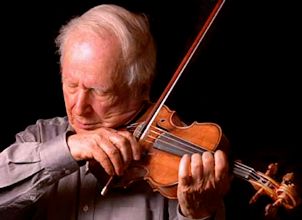 IN October 1944, Stuart Canin was an 18-year-old violinist bound for Juilliard. Then he was drafted. His basic training was even cut short by four weeks, so that he and other new recruits could get to Europe as quickly as possible. "I carried my rifle and a fiddle," recalls Canin, concertmaster of the Los Angeles Opera. "I still remember the guy watching me walk across the gangplank who asked, 'What are you going to do with that?' I said, 'You never know.' "
Soon after, Canin and List "were informed that President Truman was coming to Europe for a conference, so we were pulled from the company and flown to Berlin and driven to a suburb in order to provide some of the entertainment for a dinner Truman was giving." Canin and List watched as "one big black limousine after another rolled up. We recognized Truman, Marshal Stalin wearing his khaki uniform with the shoulder board, and Churchill smoking a cigar, Adm. Leahy, Gen. Marshall, Secretary of State Byrnes, Molotov -- the whole cast of characters on the front page of the New York Times if you read it for a week." Canin still has the V-Mail he sent his parents the next day from the site: Potsdam. Afterward, the Army "sent Gene and myself to Army camps to see if we could cull bassoon players, oboe players, instrumentalists still in Europe who had played professionally. In September, our whole unit was transferred to Frankfurt, Germany. By that time, they had enough players to make up the first symphony organized for the Army, which they called the GI Symphony. It was later superseded by the 7th Army Symphony. We gave concerts for GIs, British, Russian and French troops, traveling in ambulances, about eight to an ambulance -- which were damn cold in the winter."
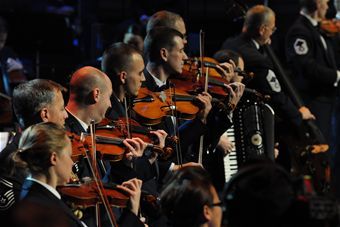 (After a 1960 plane crash over Rio de Janeiro took the lives of 18 Navy string players, the Navy Band never rebuilt its string section.)
The string sections each perform alone -- typically show music and light classics -- but players also mingle with other musicians to form symphony orchestras, chamber ensembles and smaller groups. (After a 1960 plane crash over Rio de Janeiro took the lives of 18 Navy string players, the Navy Band never rebuilt its string section.)
The string sections each perform alone -- typically show music and light classics -- but players also mingle with other musicians to form symphony orchestras, chamber ensembles and smaller groups.
All three string sections play at the White House and State Department, but members of "The President's Own" don't go through boot camp, says Gunnery Sgt. Kristin Mergen, its public affairs chief, "because we have one mission only: to perform for the president of the United States."According to Lt. Cmdr. Lisa Brackenbury at the Pentagon Navy news desk, " 'The President's Own' was founded on July 11, 1798, and is considered the oldest musical organization in America." An alternative to student deferment
De Veritch's father, a violinist, was anxious to find a way to sustain his son's concert career, so he researched opportunities for musicians in the military. He discovered that musicians in "post bands or fort bands were part of the regular fort, so if that fort gets shipped out to fight the battle, even though you're a musician, you go and you fight." De Veritch's father also found out about "all these different musical entities that were centered in Washington, D.C., and discovered that the Marine Band did carry strings." So De Veritch enlisted and joined the Marine Band, knowing he was signing on for White House duty.
Rothmuller, who took the White House option, remembers the unique stress of the audition: "In this case, you were auditioning literally for your life."
"We arrived in Washington on Jan. 31, 1967. Friends laughed when they saw me: 'Look at that hair!' I had a huge Afro. 'It'll be gone tomorrow.' Who would have dreamed that within a week and a half, we'd be playing a state dinner in the White House for King Hassan of Morocco?" De Veritch says, "I went to the powers that be at the Marine Band and negotiated that Danny, Ray and violinist Andrew Zaplatinsky would join me there, and we would be called the White House String Quartet, an unofficial unit of the Marine Band. They gave us about two days of the basics so we wouldn't look like total idiots. 'This is how you tell who's an officer. This is how you salute, shine your shoes, how to polish the brass on your uniform.' But even then, we did look like idiots half the time."
"We started playing, everyone's talking, when suddenly the chancellor hits his glass and is shushing everybody. Nobody could move. We had been having a good time. All of a sudden, they're staring at us, listening to every note." Kobler remembers the fear they felt as "we shifted gears and were now playing a concert. And you get nervous, you start sweating, going into concert mode. We had to stop playing after 20 minutes because nobody could eat or talk." Rothmuller laughs as he recalls the aftereffects: "Our stock went way up at the State Department. ... The next time the quartet showed up, we were served dinner, like the grown-ups." During their stint as the White House String Quartet, the men were also frequent guests at Justice Abe Fortas' house for dinner and chamber music. Fortas, an amateur violinist, had made it clear to President Lyndon Johnson that he was not to be disturbed on Sunday nights, when he played chamber music with friends. De Veritch remembers: "You'd sit around the dinner table with three or four other justices of the Supreme Court and maybe Henry Kissinger, just key people. There would be some political talk, but nothing confidential." He added that when Fortas resigned in May 1969, newspapers printed a photograph showing Rothmuller, Budapest String Quartet violinist Alexander Schneider, "Abe Fortas and me playing quartets in the foyer of the White House. And behind us are LBJ, George Meany, Gerald Ford and the rest of the Marine Strings, all watching us." (photo, below)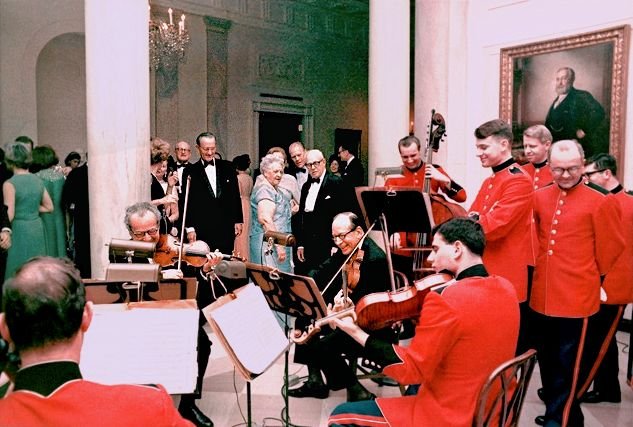
| |
|
January 25th, 1968, from left: Daniel Rothmuller (from back, cello), Alexander ("Sasha") Schneider (1st violin), LBJ (standing), Abe Fortas (2nd violin), Dave Wundrow (standing, bass) -- making this piece technically a string quintet -- and Alan de Veritch (seated, viola). | |
|
After the members of the White House String Quartet finished serving their four years, they still faced two years in the reserves. De Veritch figured "they probably weren't going to call the people who were least qualified, which was us." But, toying with the idea of continuing to perform under the name "White House Quartet," he wrote to President Richard Nixon. Five days before the Watergate scandal broke, he received a letter from the White House counsel declining authorization of the name. De Veritch still has the letter, written and signed by John Dean III. Another career path for musicians NOW on the faculty at Indiana University, De Veritch says, "As far back as I can remember, brass players, percussionists and winds always looked at openings in the military bands as a viable option to symphonies. In recent years, a lot of the string players do as well. All of my students contemplating orchestra careers, taking auditions, also look into the military bands." Rothmuller delineates the perks: "You have everything taken care of -- retirement, medical, PX, which is the military store. They sell every single thing you can imagine. And it's like buying wholesale. So you might not be making as much money as you would with the New York Philharmonic or the National Symphony, but then again, you don't have to spend that money. It's security. You can't get more security than what the armed forces gives you."
The Army Band, like the Air Force Band, requires basic training of its musicians. Fernandez was 29 when she went to boot camp, training with 18- and 19-year-olds. Today she's a sergeant first class, one of the 18 string players and one accordion player who make up "Pershing's Own," performing at dinners at the White House and State Department and for various military functions. Although the Marine Band strings perform during cocktails and the main course and again after dessert, the Army or Air Force strings play everything from memory and "come out strolling during dessert," she says. De Veritch explains that the "strolling strings" are "more like a featured entertainer." Army Strings, Fernandez says, is a wonderful job for a mom with kids: "I'm there four days a week but not gone all day, which is perfect. Right now, we have a few expectant moms in maternity uniforms when they stroll." Fernandez explains that even though the Marine Band skips basic training, "they still have to weigh in." She adds, "There's no flexibility. It's as strict as training to be on the front line." Band members are required to do a physical fitness test "and have to do our two-mile run every six months. The logic is, we may be musicians, but when we play for generals, we're soldiers in the U.S. military." With the shortage of troops in Iraq and the redeployment of others, there's been speculation about reinstatement of the draft. Were that to happen, there would likely be even more competition for positions in military bands. As it is, there already are many more professionally trained musicians in the U.S. than orchestral jobs. The August issue of the journal International Musician listed two vacancies in the Air Force Strings: one for violin, the other for cello. In the September issue, they were gone.
He remembers a former roommate, violist Phil Eastham, who wasn't so lucky: "Phil was the sweetest guy, the last person you would think of carrying a rifle or anything. He is on the wall of the Vietnam Memorial." |
|
|
Copyright 2005 Constance Meyer. All rights reserved |
|
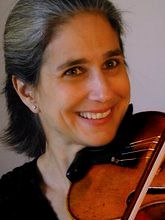
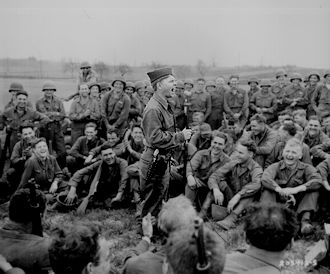 True enough. By July 1945, two months after V-E Day, Canin found himself a member of the 6817th Soldiers Show Company, touring hospitals on the Continent with the likes of
True enough. By July 1945, two months after V-E Day, Canin found himself a member of the 6817th Soldiers Show Company, touring hospitals on the Continent with the likes of
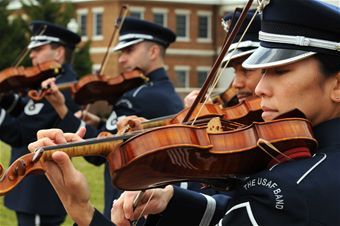 As the occupation of Iraq wears on, prompting criticism of its human and financial costs, there's one item in the Pentagon budget that is rarely remarked upon: musicians in uniform. Although people hear brass bands marching up and down
parade grounds, comparatively few members of the public have an opportunity to hear
As the occupation of Iraq wears on, prompting criticism of its human and financial costs, there's one item in the Pentagon budget that is rarely remarked upon: musicians in uniform. Although people hear brass bands marching up and down
parade grounds, comparatively few members of the public have an opportunity to hear
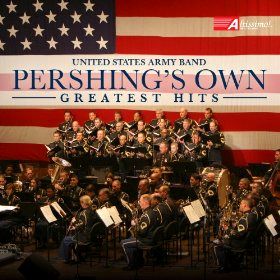 The U.S. military has more than 150 service bands all over the world -- 8,000 to 10,000 musicians total, if all slots were filled. There are even bands in Afghanistan and Iraq. Each service -- Army, Air Force, Marines, Navy and Coast Guard,
which is part of Homeland Security -- has its own bands and music budgets. In 2006, for example, the Navy alone will spend more than $2 million on its Washington band and 12 fleet bands, the Defense Department says.
The U.S. military has more than 150 service bands all over the world -- 8,000 to 10,000 musicians total, if all slots were filled. There are even bands in Afghanistan and Iraq. Each service -- Army, Air Force, Marines, Navy and Coast Guard,
which is part of Homeland Security -- has its own bands and music budgets. In 2006, for example, the Navy alone will spend more than $2 million on its Washington band and 12 fleet bands, the Defense Department says.
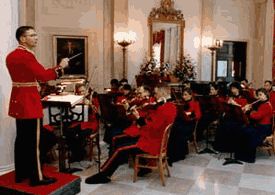 Many
military musicians have a secondary duty and are trained should they
need to fight. But there are also five first-rank "premier" service
bands based in the Washington, D.C., area: the Navy Band, the Army
Field Band and three bands that include strings -- the Army's "
Many
military musicians have a secondary duty and are trained should they
need to fight. But there are also five first-rank "premier" service
bands based in the Washington, D.C., area: the Navy Band, the Army
Field Band and three bands that include strings -- the Army's "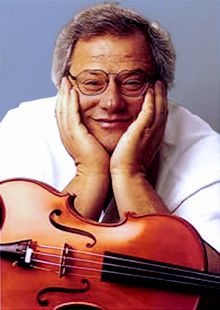 IN 1965, as the Vietnam War was intensifying,
IN 1965, as the Vietnam War was intensifying, 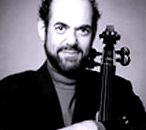 Daniel Rothmuller
Daniel Rothmuller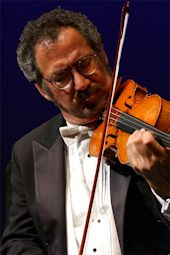 Violinist
Violinist 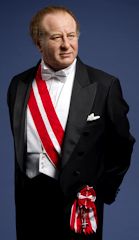 Rothmuller remembers the officer in charge of the Marine Strings, Col. Albert Schopper, telling them, "Dean Rusk is throwing the Jefferson Day dinner for
Rothmuller remembers the officer in charge of the Marine Strings, Col. Albert Schopper, telling them, "Dean Rusk is throwing the Jefferson Day dinner for
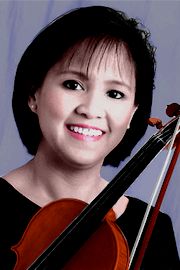 The biggest difference in service bands today, versus the Vietnam era, is that women are included. In 1995, violinist
Dionisia Fernandez, a Juilliard graduate, was freelancing in Washington, D.C., when string player friends in the Army Band
told her about an opening. She remembers thinking, "That's weird. Army strings?" But "it just opened up a whole new world of musicians for me here. A lot of musicians don't know about that."
The biggest difference in service bands today, versus the Vietnam era, is that women are included. In 1995, violinist
Dionisia Fernandez, a Juilliard graduate, was freelancing in Washington, D.C., when string player friends in the Army Band
told her about an opening. She remembers thinking, "That's weird. Army strings?" But "it just opened up a whole new world of musicians for me here. A lot of musicians don't know about that."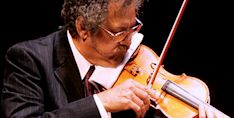 Kobler says, "We were very lucky to be able to fulfill our military obligation and not have a disruption in our careers, as so many did. We were extremely grateful."
Kobler says, "We were very lucky to be able to fulfill our military obligation and not have a disruption in our careers, as so many did. We were extremely grateful."